Despite the COVID-19 catastrophe, cyberattacks, phishing, and botched health record disposals are crowning.
As per Health IT Security, the Healthcare industry witnessed 15 million records breached in 2018. The end of 2019 was even horrible, as there was a swarm of ransomware attacks and breaches that even outdid the number of breaches seen in 2018 in the healthcare sector.
They even shared a case where Health Share of Oregon (largest Medicaid coordinated care organization) informed almost 6,54,000 patients how their data was exposed with a laptop stolen from their transportation vendor. The laptop had patient’s details, including their contact details, Medicaid ID numbers, DOB, and much more.
Such cases exigencies HIPAA (Health Insurance Portability and Accountability Act) compliant apps!
Those interacting with healthcare sectors must comprehend the importance of HIPAA compliant apps. It is important to transform your digital healthcare industry as per what’s the need of the hour (HIPAA compliant apps).
What is the Nitty-Gritty of the ‘HIPAA Compliant Apps’ Development Process?
Data is everything – since the world is more digital now than ever before.
The healthcare sector is amongst those industries that are digital, requires data safety, and strict compliances to avoid getting the user’s data misused.
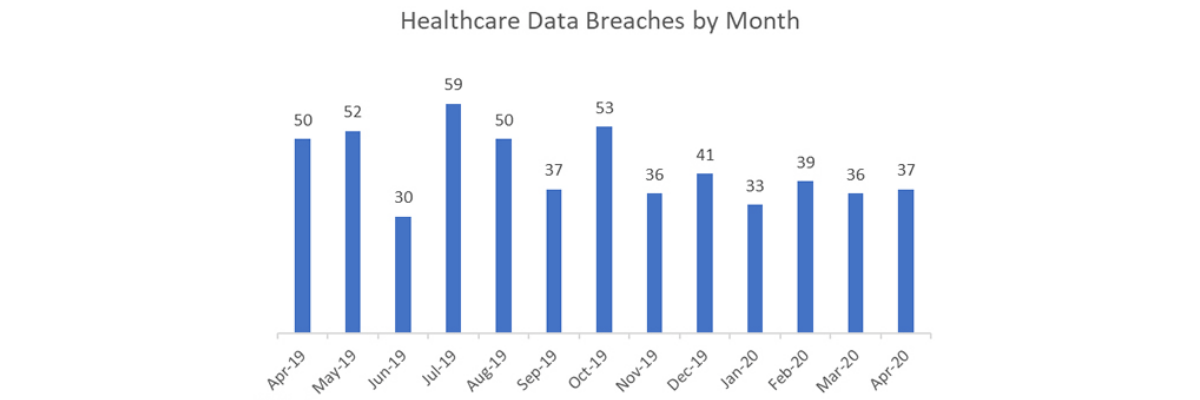
Source: HIPAA Journal
The main causes of these healthcare data breaches were hacking, unauthorized access or disclosure, theft, and loss.
What is HIPAA?
HIPAA aka Health Insurance Portability and Accountability Act is a federal law that was created with the intent to protect the patient’s health information from being disclosed without their knowledge or consent.
The purpose of HIPAA was to improve the accountability of health insurance coverage for employees between their jobs. The act intended to reduce wastage, abuse, and scams in the healthcare sector. It even promoted medical savings and simplified health insurance administration. HIPAA encouraged the healthcare sector to computerize patient’s records.
HIPAA Security and Privacy
The HIPAA Security Rule was amended in 2007, which was 2 years later from the actual legislation in 2005. It laid down three major safeguards for the security rule for dealing with ePHI or electronically stored PHI (Protect Health Information).
The three main safeguard objectives were Physical, Technical, and Administrative.
- The Physical controls inappropriate access to the areas where data was stored.
- Technical protects communications obtaining PHI over open networks when electronically transmitted.
- Administrative focuses on creating policies that display how the entity should comply with HIPAA.
What is ePHI?
Any protected information regarding health that is produced, transferred, or stored electronically is known as ePHI. The need of the hour in the healthcare industry is to keep all such information secure, protected, and safe from any fraud or abuse.
Such data and information must be handled carefully, without having any scope of abuse of breach. The protected information must be secured as per the compliance of the HIPAA Security Rule.
Types of information that is considered as ePHI under HIPAA are as follows:
- Full Name
- Complete Address (with Zip Code)
- Date of Birth
- Phone Number
- Fax Number
- Email ID
- Social Security Number
- Medical Record Number (MRN)
- Health Plan beneficiary number
- Account Number
- License Number
- Vehicle Identifiers (License Plate Number)
- Device Identifiers
- Web URLs
- IP Addresses
- Full face Photos
- Biometrics (Voice and Fingerprints)
- UIN
Some other instances of ePHI are:
- Emailed blood test reports
- E-prescriptions
- MRIs of the patient
- Patients notes in the mobile
Media used to Store ePHI includes:
- External portable hard drives
- Magnetic Tape
- Smartphones and PDAs
- Removable storage devices
What if HIPAA Compliant App is VIOLATED? (Charges, Fines, and Punishments)
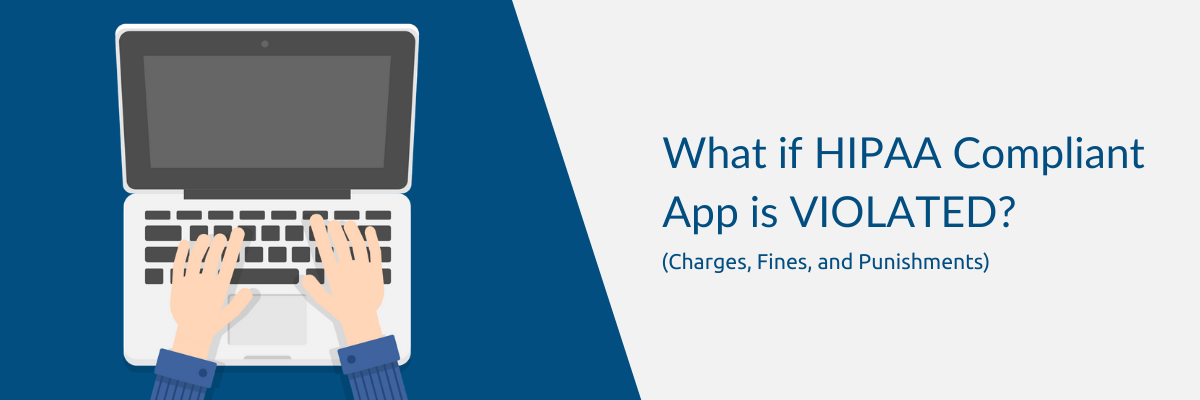
The act supports both the hospitals and the patients. It is essential to comprehend how HIPAA compliance assists them.
HIPAA Compliance for Hospitals
What happens when the healthcare sector or hospitals don’t comply with the rules of HIPAA?
Hospitals, in case, violate HIPAA policies have to pay the penalties, and their HIPAA fines are pretty expensive. The penalties rely on the level of inattention, ranging from $100 to $50000 per violation.
The maximum that any healthcare industry has to pay per year is $1.5 million. In some cases, violations carry criminal charges, which might even put the associated healthcare firm behind the bars.
They have broken down HIPAA fines and charges into two main categories:
- Reasonable Cause
- Willful Neglect
Reasonable Cause fines range from $100 to $50,000 per episode (No Imprisonment).
Willful Neglect charges range from $10,000 to $15000 for every such incident (Included imprisonment).
HIPAA Compliance for Patients
Healthcare firms must inform patients about the breach. Every patient has an inclusive right on their medical details. No matter how petite or large the breach is, the healthcare institution is bound to notify patients about the same.
No healthcare institution can share the patient’s information without their consent. Only healthcare professionals can share their patient’s specifics with stakeholders. Also, PHI covers only those stakeholders who appear in healthcare procedures.
Even prescription vendors are not allowed to share the patient’s information.
HIPAA Compliant App – How to Develop One?
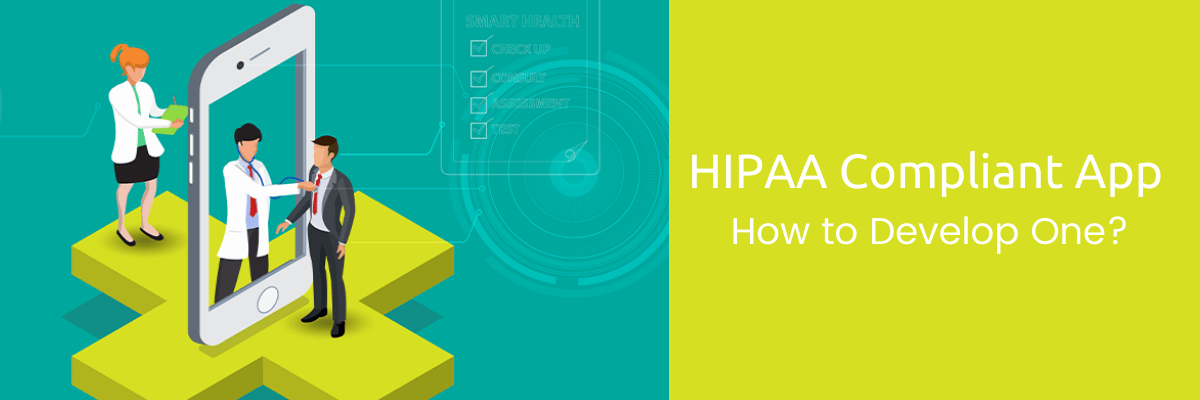
One of the prerequisites for building a HIPAA compliant healthcare app is the number of alterations it requires - the layout, customizations, and smooth UI are certain factors that constantly need alteration.
How do we know that?
We have built dozens of HIPAA compliant apps for efficient healthcare businesses across the world. Our offshore remote development team understands how efficient these apps should be.
Building HIPAA Compliant Applications – The Process
How does a HIPAA app look like? Is there anything precise that developers need to consider while developing HIPAA mobile apps? Does it follow the same development procedure?
Too many questions, right?
Well, here is what a HIPAA compliant app should look like.
The Objective of HIPAA Compliant Application
HIPAA compliant app intends to deliver secure and safe healthcare services to the patients while maintaining their data privacy. For doctors and healthcare institutions, it aims to store patient’s data more securely while allowing them to deliver aptly managed healthcare services.
Hence, a reliable source for the utmost safety, privacy, and service management.
To conclude the objective of HIPAA compliant app, we can say that it boosts:
- Privacy
- Security
- Seamless Execution
- Zero Chances of Breach
And, that goes for both the parties – The Patients and The Healthcare institutions!
Features of HIPAA Compliant App (PATIENTS & DOCTORS)
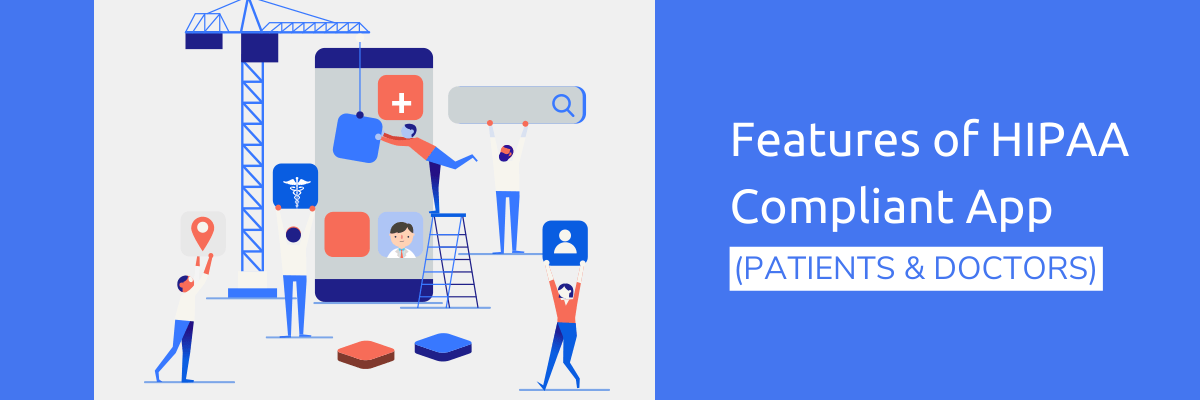
The HIPAA compliant mobile app allows easy authentication of the user, access reports, or essential information at the time of emergency, encryption for safer data transfer, and storage.
Here are some essential features in a HIPAA compliant app that is beneficial for both the patients and the healthcare institutions:
Features of HIPAA Compliant App for Patients
This app should incorporate certain features that fulfill the safety of the patient’s information.
1. Chat and Messaging
Communicate easily with the doctors and nurses! Patients may have any query or need certain advice or suggestion on something instantly. It might not be feasible for him/her to see the doctor at once. In such cases, this feature comes handy. HIPAA compliant messaging app is the basis of smooth conversation between the doctor/nurse/healthcare professional and the patient.
2. Reminder Update
Not all of us are good at remembering dates and appointments. The in-built ‘reminder update’ feature will ensure that every patient receives a timely reminder for the upcoming appointment with the doctor. In cases when doctors and nurses are not available in the hospital can be conveyed to patients without any hassle through this HIPAA compliant app.
3. Schedule Appointments
Easy to book appointments and follow up with the doctors. Patients should enjoy the ease to book the appointments without any trouble, right? That’s what a HIPAA compliant app does for the patients. It allows them to book a time slot as per their needs. The app displays a doctor’s calendar that has vacant time slots.
Want to work with a team of experts that are ready to take any challenges? We have got your back. Just get in touch with us & build your offshore development team within a week's time?
Features of HIPAA Compliant App for Doctors/Healthcare Institutions
This app should incorporate certain features that deliver a seamless service management system to the doctors.
1. Secure Data Sharing
What would any healthcare institution or doctor expect from the healthcare app? Well, nothing much but proper means to communicate with the patients, safe messaging platform, and easy-to-access upcoming appointments. HIPAA compliant apps do that all.
2. Store Patient Information
The world is digital now, more than ever before. Physicians need more time to treat patients and less time looking for patient’s files. Any healthcare app should allow easy messaging options along with an effective way to transfer data to patients. The app must support proper graphics, charts, PDF files, reports, images, and videos on a single screen. And, that’s what creates a challenge for the development team.
3. Send & Receive Notifications
The app must support timely notification on all devices! Easy reminders and upcoming appointments would save much time and allow doctors to treat more patients. Being a HIPAA compliant solution for the healthcare world, it can’t flow over to any other app on their smartphones.
Essentials of HIPAA Compliant Healthcare App
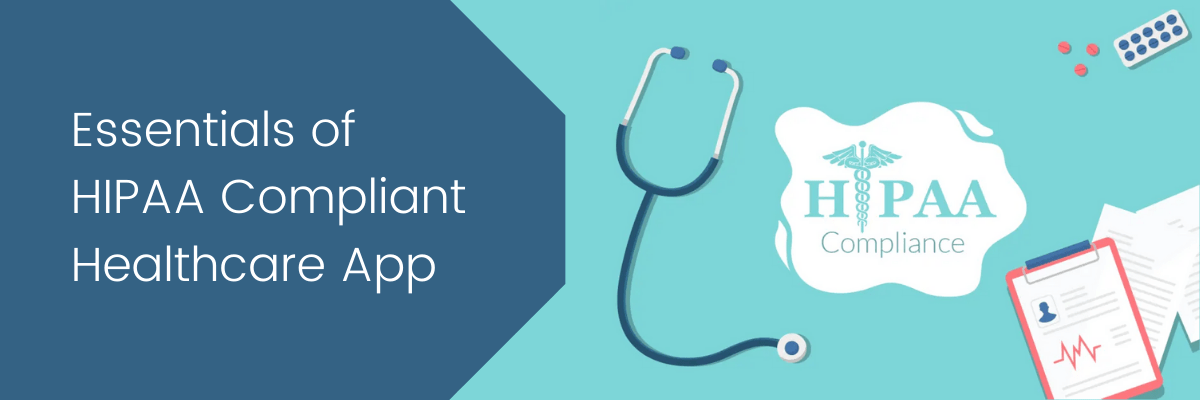
Well, there is a process! Yes, your dedicated offshore developers have to be focused, alert, and skilled enough to build a HIPAA compliant app.
HIPAA Compliant App is based on two main safeguards – Technical and Physical.
✓ Technical
HIPAA compliant apps must provide complete data security – when it is transferred, stored, or shared. The data is never compromised or misplaced, and the patients barely fret about the data exploitation or mishandling anyway. Such healthcare mobile apps must have proper authentication for access.
✓ Physical
Data encryption is the focus here! Considering the physical safeguard, we need to design the HIPAA compliant app that automates emergency access, provides a unique identification number to every patient, and allows instant login and log out options. The digital health apps must require minimum information from the user while still identifying them. The backups and logs should be accessed only and if required in emergency cases.
How We Build HIPAA Compliant Healthcare App?
We deliver quality mobile applications for different businesses – healthcare too!
Our offshore mobile app developers have mastered the methodologies to develop HIPAA compliant applications. The apt certifications and expertise in the industry have allowed us to deliver thousands of apps until now and continuing.
We follow a rich app development process when building HIPAA compliant applications.
Here’s how we deploy high-end and feature-rich HIPAA compliant apps for successful healthcare management and assured patient’s privacy.
Keep ‘Health Data’ Encrypted
We comprehend that HIPAA software is incomplete without appropriate data encryption when transferred. For proper data encryption, we follow the encryption process on the dispatcher’s side and then on the receiver’s side.
Why data on apps built by us are never compromised or misused?
Because, we ensure data integrity using hash values, which is a numeric value of a certain length that distinctively recognizes data.
Well-Protected Authorization
We aim at deploying HIPAA compliant apps that are timely upgraded and altered to match the need of the user. Besides, our developers never hesitate in modifying the apps for better security and protection.
The data must be accessed only by the identified user. We ensure the healthcare mobile app does fulfill this requirement.
Utmost Safety
Our HIPAA compliant apps are built utilizing technologies and tools that store, transmit, alter, or accumulate information with utmost safety. By no means, anyone who doesn’t have access to the app will be able to access this information or modify it anyhow.
Our apps seamlessly identity unauthorized logins, unknown access, and any other suspicious activity done on the app.
Our secure healthcare solutions don’t allow any alien activity or chance of a breach, making it a reliable and secure option for both the doctors and the patients.
Well-Timed Recovery
We don’t wait for the app to misbehave! Our remote development team acts quickly on recovery solutions and works on timely backups. Timely backup of important data, patient’s messages, appointment scheduled dates are taken, so that in case of recovery, nothing is damaged. The data that is no longer needed is deleted – we don’t keep anything that’s not needed.
The Final Thoughts
Scrutinizing the accelerated cases of data breach and theft in the healthcare industry, HIPAA compliant apps have become the need of the hour. Such apps are mandatory for every healthcare institution and even patients for maintaining the required safety of patients, data, and everyone who interacts with the healthcare sector.






